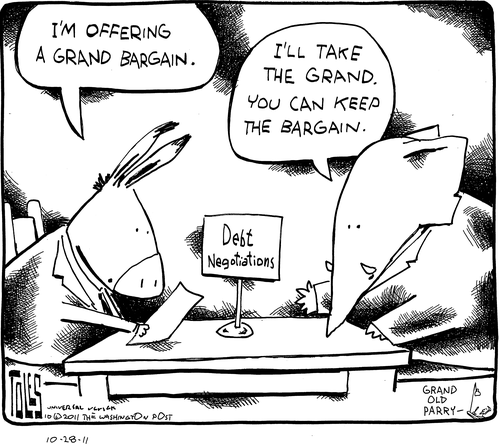The do nothing Congress will slither out of town seven weeks before the election to hit the campaign trail and leaving a pile of work for November when they return for the lame duck session. Not that most of them aren’t lame now. They had originally been scheduled to work through to the first week of October.
The one bill that will be passed is the bill to keep the government funded once the new fiscal year begins Oct.1. It has already passed the House and is set for a vote in the Senate later this week. it will find the government through to March 27, 2013. The other legislation that will pass at least the House is a resolution expressing disapproval of President Obama’s handling of welfare reform. The administration agreed to to waive existing work requirements for those who receive welfare benefits if states can demonstrate better programs for employing and retaining workers. This waiver was requested by Republican governors, as well as, Democrats and the plans must be approved by the administration. In other words the House Republicans are disapproving something they requested.
Bur much of what won’t be accomplished could drastically hurt the middle class and the economy.
Greatest fallout from deadline miss: uncertainty
The 2008 farm bill, a law including crop insurance, disaster programs and other aid for farmers, along with conservation and food stamp programs, is set to expire Sept. 30, the end of the federal fiscal year. Some key programs could cease or run out of money without a new farm bill.
But farmers and ag policy experts say the most dramatic effects won’t happen until 2013. That’s when farmers will start to plant next year’s crop. Many farm programs operate onthe crop year, not the fiscal or calendar years. [..]
If Congress doesn’t do anything, food prices could soar. That’s because without a new farm bill, the law reverts back to a 1949 farm bill that essentially committed the federal government to purchase crops at fixed prices. But with more than 60 years since those prices were set, in most cases the government would be paying far more than what those crops receive today.
There is the legislation that would provide reforms for the Postal Service, which is plagued by financial shortfalls, and an extension of the Violence Against Women Act, a normally bipartisan bill that authorizes program funding for victims of domestic and sexual abuse.
The biggie is the expiring tax measures, the Bush/Obama and the Payroll tax holiday, and unemployment benefits, that will end December 31. As reported in Politico the House Ways and means Committee, which generates tax bills will meet in a rare closed session on Thursday. They will also meet with the Democratic-led Senate Finance Committee to discuss capital gains taxes.
David Dayen at FDL News Desk isn’t confident that the talks will include an extension of the Payroll Tax Holiday but thinks that this whole sequester mess will kicked down the road:
There’s no guarantee that the payroll tax cut will factor into these negotiations, but they should – or at least something that brings a commensurate level of fiscal accommodation, which preferably doesn’t put the Social Security Trust Fund at risk. The expiration of the payroll tax cut will take $125 billion out of the economy. That’s less than the Bush tax cuts, although since most of those accrue to the rich, the payroll tax cut could have a higher fiscal multiplier. And it’s a larger pullback in fiscal policy than the first year of the sequester, which would take roughly $110 billion out of the economy. [..]
I would like to find the economist who believes that the US can handle taking $125 billion out of the economy without an effect, especially $125 billion targeted loosely (though not as well as Making Work Pay) at those with a high propensity to spend. [..]
It’s entirely possible that everything gets punted for a period of time while opening up some breathing space for Congress to figure the mess out. But I doubt that includes the payroll tax cut. That’s decent enough news for Social Security, but it’s not really good news for the economy.
As a postscript, you gotta love this from a defense lobbyist:
“Regardless of who wins, the big deal will have tax increases and spending cuts,” said one defense lobbyist, who asked not to be identified. “The ratio will just be different. With taxes playing a smaller role in a Republican plan, entitlement programs like Medicare will have to play a bigger one to protect defense.”
Surely we can all agree that Lockheed Martin needs the money more than an 85 year-old on a fixed income.
Lets see if Obama sticks to his promise to veto any bill that extends the Bush/Obama tax cuts for those who make over $250,000.

 The deadline for the bicameral Super Committee to come up with a deal on deficit reduction is a week away. While many
The deadline for the bicameral Super Committee to come up with a deal on deficit reduction is a week away. While many  Scarecrow at
Scarecrow at  Yes, we are still playing and the Republicans have the advantage. So far they have won 98% of everything they asked for and are still holding hostages. The new extra-constitutional super committee of 12 will start work on the next round of hostage negotiations. Composed equally of Democrats and Republicans, three of each from the Senate and the House, the committee is tasked with finding $1.2 trillion in deficit cuts. Here are the members that have been selected by the leadership:
Yes, we are still playing and the Republicans have the advantage. So far they have won 98% of everything they asked for and are still holding hostages. The new extra-constitutional super committee of 12 will start work on the next round of hostage negotiations. Composed equally of Democrats and Republicans, three of each from the Senate and the House, the committee is tasked with finding $1.2 trillion in deficit cuts. Here are the members that have been selected by the leadership:
Recent Comments